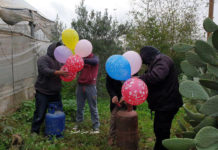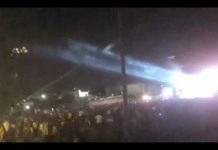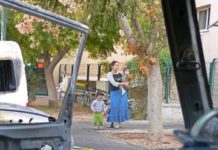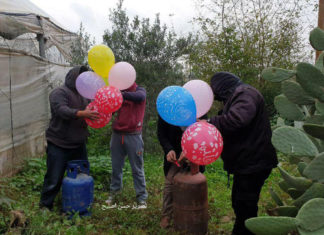A heavy barrage of rockets was fired at Israel on Tuesday night, ar around 10:40pm. Loud explosions were heard in the Tel Aviv metropolitan area, while Code Red sirens blared throughout southern and central Israel.
Hamas said it fired 40 rockets at Israel. Among them, two hit open areas in the Sha’ar HaNegev Regional Council, four more in open areas in the Eshkol Regional Council, and five hit open areas in the Be’er Sheva area.
At least one was intercepted over central Israel and another fell in an open area. Two more were intercepted over Sderot, two intercepted over Be’er Sheva, two shot down over Kiryat Malachi, three were intercepted over Ashkelon.
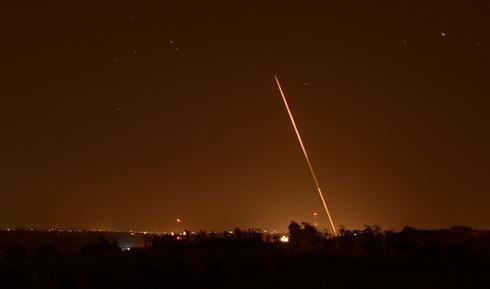
Rocket launched from the Gaza Strip at Israel (Photo: Avi Rokach)
Hamas’ armed wing, the Izz ad-Din al-Qassam Brigades, claimed responsibility for the fire at central Israel, saying they fired M-75 and Fajr-5 missiles at the Tel Aviv area and a J-80 rocket towards Ben Gurion International Airport.
The latest ceasefire, that was set to expire on midnight, was broken some 8 hours earlier when three Grad rockets fired from the Gaza Strip fell near Be’er Sheva and Netivot on Tuesday afternoon. The IDF responded by hitting different targets in the Gaza Strip.
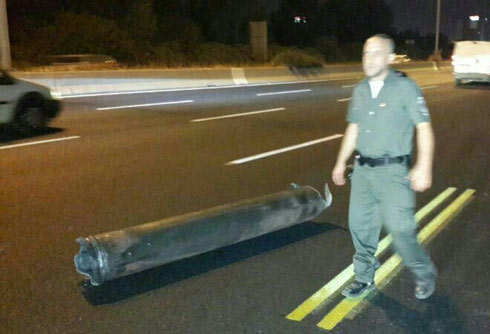
Rocket shrapnel found near Beit Dagan.
Later, rockets were fired at Netivot and the Sdot Negev Regional Council. Two of the rockets were intercepted over Netivot while one fell in an open area in Sdot Negev. After 8pm, rockets were fired at Ashdod and Hof Ashkelon, both falling in open areas.
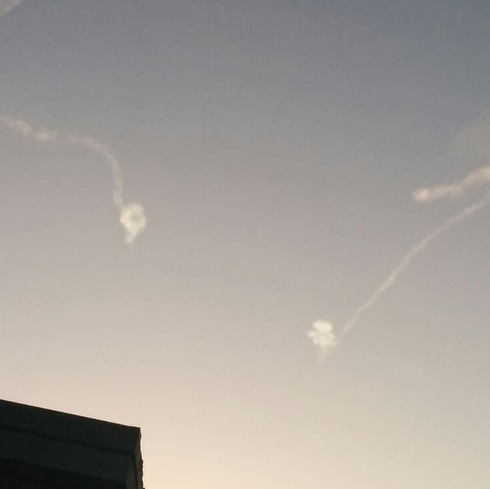
Rockets intercepted over Netivot (Photo: Sdot Negev Spokesman’s Office)
Sami Abu Zuhri, a spokesman for Hamas, the dominant movement in the Gaza Strip, said it had no knowledge of any rockets being fired.
Even before the rocket fire, the Associated Press quoted Hamas spokesman Fawzi Barhoum, who hinted of more rocket fire, saying: “If Netanyahu doesn’t understand… the language of politics in Cairo, we know how to make him understand.”
The rocket attack came hours before a ceasefire deal was exepcted to be signed in Cairo, but in wake of the attack Israel decided to recall its delegation, which was still in Egypt holding indirect talks with Hamas when rockets began to fall. The move seems to indicate that attempts at reaching a deal have collapsed. Palestinians for their part claim the IDF targeted Gaza before the rocket fire.
The rockets fell in open areas between Netivot and Be’er Sheva in the south and no injuries or damage were reported. This was the second time rockets were fired at Israel since a five-day ceasefire came into effect last Thursday. At the time, the IDF said Gaza militants had breached the truce by firing eight rockets at Israel shortly after midnight Thursday.
Local residents in Gaza said they saw militants attempt to fire rockets, and afterwards Israelis living near northern Gaza and the Be’er Sheva region said they heard a number of blasts.
While Palestinian sources expressed optimism that the fighting would not resume at midnight, Israeli officials continued to emphasize that the IDF was prepared to resume its operations.
“We are prepared for every scenario. The IDF has made arrangements for a forceful response if the fighting resumes. In the Middle East you need a combination of force and resilience. The IDF has the necessary force, and the ‘eternal people’ have proved they are not afraid of a winding road,” said Netanyahu earlier Monday night.
He emphasized: “The combination of perseverance and fortitude will help us reach the aim of the operation – security and safety for all Israelis.”
Shaky ceasefire
Last Thursday, in response to the breach in the ceasefire, Israeli fighter planes targeted “rocket launchers and terror sites” across the enclave later Thursday. No casualties were reported and hostilities died down by dawn Friday.
The second extension of the ceasefire, at the time for five days rather than three, has raised hopes that a longer-term resolution to the conflict can be found, although the way ahead remains fraught with difficulty.
A senior Hamas official who returned to Gaza from the negotiations in Cairo said they had been tough but expressed some optimism.
“There is still a real chance to clinch an agreement,” Khalil al-Hayya told reporters, saying that it depended on Israel not “playing with language to void our demands”.
“The Egyptian mediators are entering a good effort and we wish them success in this negotiation battle.”
After more than a month of intense conflict, which killed over 2,000 Palestinians, many of them civilians, as well as 64 Israeli soldiers and three civilians in Israel, there is little appetite on either side for a resumption of bloodshed.
Hamas and its allies want an end to the Israeli and Egyptian blockade on Gaza. But Israel and Egypt harbour deep security concerns about Hamas, the dominant Islamist group in the small, Mediterranean coastal enclave, complicating any deal on easing border restrictions.
Attila Somfalvi, Ilana Curiel and Reuters contributed to this report



